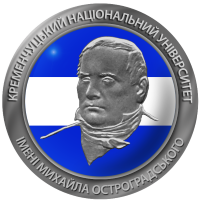
From June 24 till June 26 trainings were held at our University for the staff of the Department of Electronics and Computer Engineering and the Institute of Electromechanics, Energy Saving and Control Systems within the implementation of the European Union Erasmus+ KA2 №598236-EPP-1-2018-1-LT-EPPKA2-CBHE-SP project – the Digital competence framework for Ukrainian teachers and other citizens (dConFra). The purpose of this event was to train the contingent of lecturers for teaching in the KrNU Office of Digital Competences.
As previously reported, in May this year, an Office of Digital Competences was created at our University. According to the roadmap of the dComFra project, Ukrainian teachers and other categories of citizens of Ukraine will improve the skills in the field of digital competences in this Office. Such an office will be the only one in Poltava region that will be accredited for certification according to the European Computer Driven License (ECDL), and will be able to accept people who wish to obtain a certificate from Poltava and neighboring (Dnipropetrovsk, Kirovohrad, Cherkasy, Zaporizhzhia, etc.) regions, as, according to the project, similar offices will be established in Kyiv, Kharkiv, Pokrovsk, Chernivtsi and Kremenchuk..
This event was covered in the local press (KREMENCHUKTODAY) and at the site of the Ministry of Education of Ukraine “Novyny oblastei”.
The topics of the trainings covered various aspects of education in the field of digital competencies: from the formation of skills and abilities of mastering well-known text editors, spreadsheets to very specific knowledge in the field of e-society services; from the use of typical pedagogical approaches to the application of the latest methods of gamification of the learning process in the field of digital literacy.
The trainings were organized and held by the representatives of the work team of the dComFra project: Head of the Department of Computer and Information Systems (CIS) Prof. Mykola Huchenko, Associate Professor of CIS Department Valerii Sydorenko, Associate Professor of the Department of Automation and Computer-Aided Technologies Dmytro Mamchur, Senior Lecturer of the Department of Automatic Control Systems and Electric Drive Oleksii Kravets.
Taking into account the quarantine measures and restrictions, the event was held in the format of blended learning – a kind of hybrid methodology, when there is a combination of online learning with traditional and independent learning. Depending on personal circumstances, each of the participants had the opportunity to choose the method of participation – either to visit the venue in person, or to join the classes online.
The first working day of the trainings began on June 24 in the DC-office of the University with a welcome speech by the rector of KrNU Prof. Mykhaylo Zagirnyak. The rector noted that, realizing the importance of this project for the development of the region, the university administration decided to repair and furnish one of the best auditorium premises to create a DC office. In addition, the rector observed that it is no coincidence that the main building of KrNU was chosen as the location of the DC-office, because the presence of a ramp makes the DC-office accessible to people with disabilities.
The training began with the report of Assoc. Prof. Dmytro Mamchur on the basic questions “Digital literacy in Ukraine and the EU” and “Digital knowledge evaluation and certification. ECDL Example)”, because it is ECDL, European Computer Driving License that is a system of European computer skills certification selected by the dComFra project as the basic one.
The second half of the first day was devoted to modern means of improving the effectiveness of learning by the example of information technology Web 2.0 (Assoc. Prof. Valerii Sydorenko) and the use of the learning environment Moodle (Assoc. Prof. Dmytro Mamchur).
The next day, June 25, the training was held at the Ukrainian-Polish Center for Education, Science and Culture of the University. The audience studied the European experience in media literacy and methods of information validation (Assoc. Prof. Valerii Sydorenko), the use of pedagogical methods for a successful educational process (Prof. Mykola Huchenko), the organization of digital online educational laboratories (Senior Lecturer Oleksii Kravets).
The third working day, June 26, was devoted to a review of modern teaching aids and innovations in software and hardware of the educational process in Ukraine and the world, analysis of approaches to modeling student behavior in improving the quality of education (Prof. Mykola Huchenko), methods of using computer applications in computer laboratories by means of solutions from Docker tools (Senior Lecturer Oleksii Kravets).
In general, all the provided material was received by the audience with great interest and was accompanied by lively discussions at the end of each training modules.
At the official closing of the training, representatives of the project work team, Associate Professors Dmytro Mamchur and Andrii Gladyr acquainted the participants with further steps in the project implementation, in particular, they announced the beginning of a new important stage of the project development of training modules for distance learning of Ukrainian teachers, internally displaced persons, anti-terrorist operation veterans and other categories of citizens.









